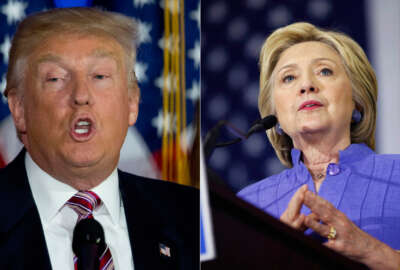
Presidential transition an opportunity to reset knowledge management
Former chief knowledge officers says the presidential transition is a good time to reassess how information is shared among employees, managers and administrations.
The presidential transition is a time of significant change, but it’s also an opportunity to strengthen the continuity of knowledge management.
Art Schlussel, program manager at the Food and Drug Administration’s Center for Devices and Radiological Health, told Federal News Radio that the arrival of a new administration highlights the importance for federal workers across the GS scale to “always be thinking how is my knowledge going to be transferred going forward.”
“It’s always thinking ahead; who else needs to know, who needs to know what and probably right now with the upcoming election, what do I need to know that I don’t know, that’s going to help me do my job if there is major change once the election takes place,” said Schlussel, the former chief knowledge officer for the Army’s Installation Management Community.
Schlussel was one of four former knowledge officers speaking on a panel at the Aug. 24 Digital Government Institute’s 930 Gov: End-of-Year Intelligence conference, in Washington.
“At some point, somebody’s going to retire, and so it’s probably even more highlighted at this point in time, no matter where you sit in the federal government, there’s going to be transition and change,” Schlussel said. “You should always think about what do I need to codify, what do I need to tell other people, what do I need to do to make sure that what I know gets transferred on to either the new administration or the person taking my place? Or the person that’s taking my place when I’m on vacation.”
Telling a story
Transferring that information is where knowledge managers can take the lead, whether it’s during an administrative transition or day-to-day federal business.
Bill Kaplan, founder of Working Knowledge, a knowledge management consulting company, said the transition is a good place to talk about the value of learning, but if knowledge managers and feds are just starting to focus on this now, “it’s probably too late.”
“But I doubt that’s the case because presidential transitions go along on history,” said Kaplan, who is also a 40-year veteran of federal acquisition and program management. “One of the first things that the people involved with it should be doing is reviewing the knowledge associated with presidential transitions in the past; what were the things that were effective and worked and why did they work. What turned out differently from planned, why did it turn out differently and what was learned that can be used to improve the process in the future.”
Schlussel said feds should talk to their supervisors, “no matter what level you’re at, to find out what’s important, what are they thinking about.”
“I always try to start every project, every program that I’m managing, with the end in mind,” Schlussel said. “Before I start I want to know, and I want everyone else to know, and I want everyone else’s buy-in, including senior leadership, because if they don’t buy into it, it’s not going to happen.”
Kaplan said it’s important that chief knowledge officers have a seat at the executive table.
Chief financial officers, technology and information officers, and human capital officers are each accountable for a different asset in an organization, Kaplan said, so “why would you not have someone accountable for knowledge of that organization?”
“You have to be able to demonstrate, to every individual from the bottom to the top and the top to the bottom, that there is value in investing their time in capturing, adapting, transferring, reusing knowledge,” Kaplan said. “If you tell them to do it, they may do it, but it will not be sustainable over time.”
Schlussel said one way to explain the benefit of knowledge management in your office is to tell a story that explains the reason for why this information transfer needs to happen.
“I always look at what the end result is supposed to be … how is the organization going to look, how are people going to operate … what betterment is there for doing what we’re going to do,” Schlussel said.
He also warned that it’s easy for knowledge management to transform into an IT solution, or a lessons learned center or a portal of how-tos for processes and methodologies.
“There are human issues that come into play, there are process issues that come into play, and by knowing where you want to be at the end, and trying to have this shared vision of what it’s going to look like … you can finally start exposing all of these things that are not typically thought of as things that will impact knowledge management,” Schlussel said. “At least to the novice or to the leader, because they’re going to have to fund it, they’re going make some decisions, they really have to understand what they’re getting themselves into, because if they don’t you’re probably not going to achieve that goal down the road.”
‘The time is now’
Thinking about a transfer of knowledge can be a heavy lift, but it doesn’t have to be if someone keeps it always in the back of their mind.
But a presidential transition is a good place to start.
“It highlights that change is coming,” Schlussel said. “And so you should always be thinking, how am I going to deal with that change, both personally for yourself, for how am I going to do my job. … and then how do I help other people excel by giving them the information, the knowledge that I have.”
The problem, however, is that there is no real discussion about leveraging that knowledge around presidential transitions themselves, Kaplan said.
It’s not an easy task transitioning an entire administration he said, and it’s important not only to give credit to the people who actually make it happen, but to also provide transparency for the public so they can understand “the complexity that these people on a daily basis have to deal with.”
Kaplan said the key to doing this is a retrospective, in which the transition team sits down immediately after the change is complete, and talks about “what were our objectives and how do we measure success?”
“Did we do it? What was effective and why, what turned out differently than we planned and what did we learn from it?” Kaplan said, that way the next transition team can be even more effective that its successor.
“The time is now, right after this one’s over,” he said.
Copyright © 2025 Federal News Network. All rights reserved. This website is not intended for users located within the European Economic Area.





